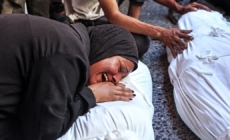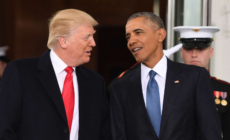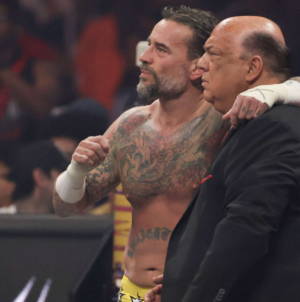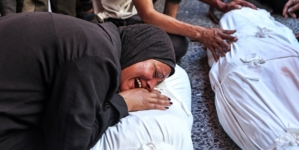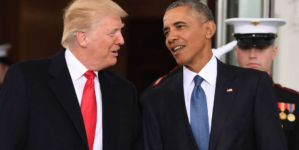-
Chris Paul returning to Clippers is 'Rakim, Big Daddy Kane forming a super hip hop group' | First Things First - 12 mins ago
-
King’s Foundation responds to alleged gardener exodus at Highgrove House estate - 15 mins ago
-
McLaren CEO Breaks Silence on Christian Horner Ousting: ‘Lot of Drama’ - 46 mins ago
-
Luke Bryan jokes about viral Coldplay Kiss Cam CEO scandal - 55 mins ago
-
Italy on Brink of Euro Final, 3 Years After Players Were Permitted to Turn Pro - 58 mins ago
-
Pepsi to introduce prebiotic cola this fall after buying Poppi - about 1 hour ago
-
Man accused of killing pastor who was found with arms outstretched, ‘similar to a crucifixion’ - about 1 hour ago
-
UK, Canada and 23 other countries slam Israel over Gaza, say war ‘must end now’ - about 1 hour ago
-
Donald Trump’s Obama AI Arrest Video Is Mere ‘Distraction’: Legal Analysts - about 1 hour ago
-
Billy Joel reassures fans he’s ‘okay’ despite NPH brain condition - 2 hours ago
Iran to Hold Nuclear Talks With 3 European Countries
Leaders from Iran, Germany, France, and Britain are finalizing plans to discuss Tehran’s nuclear program, a major source of global tension, “in the coming week,” a German diplomatic source told Newsweek on Sunday.
Newsweek has reached out to press representatives for France, Britain, and Iran via email for comment on Sunday.
Why It Matters
Iran’s nuclear program has long been a source of international concern. In 2015, Iran and several world powers including France, the United Kingdom, and Germany, signed the Joint Comprehensive Plan of Action (JCPOA), an agreement aimed at limiting Tehran’s nuclear activities in exchange for sanctions relief. The JCPOA is set to expire in October.
The United States withdrew from the accord in 2018 under the Trump administration, reimposing sanctions and reigniting diplomatic friction.
Iran has consistently maintained that its nuclear program is intended for civilian purposes, while the U.S. and some of its allies like Israel have accused Tehran of seeking nuclear weapons capability. Tensions spiked again last month when the U.S. conducted airstrikes on three nuclear sites in Iran, prompting Iranian retaliation with a strike on a U.S. military base in Qatar.
What To Know
The three European countries, known as the E3, “are in contact with Iran to arrange further talks in the coming week,” a German diplomatic source told Newsweek in an email Sunday.
Iran’s semi-official Tasnim news agency reported a source informed on the matter, saying, “The principle of talks has been agreed upon, but consultations are continuing on the time and place of the talks. The country in which the talks could be held next week has not been finalized.”
The organization of talks with E3 leaders and Iran comes just days after Iranian Foreign Minister Abbas Araghchi held discussions with French, German and European Union (EU) officials. That was the first formal call since the Israel-Iran war.
A German diplomatic source told Newsweek that “Iran must never possess nuclear weapons.”
They added: “Regarding the Iranian nuclear program, a sustainable and verifiable diplomatic solution that addresses the security interests of the international community is essential.”
The source continued: “If such a solution is not achieved by the end of the summer, the snapback mechanism will remain an option for the E3. We continue to coordinate closely with our E3 and U.S. partners on this issue.”
The E3 have warned they will trigger a “snapback” of sanctions on Iran by the end of summer if Tehran does not make progress on a nuclear deal. The snapback mechanism embedded in the 2015 deal allows sanctions to be reimposed if Tehran is found noncompliant.
Washington and Tehran held five rounds of nuclear talks mediated by Oman this year. Talks halted after Israel launched “Operation Rising Lion,” a military campaign against Iran that it said was meant to preempt a reportedly planned Iranian attack and disrupt Iran’s nuclear capabilities.
The war intensified when the U.S. joined and bombed three Iranian nuclear sites, Fordow, Isfahan and Natanz, in the largest B-2 operation in U.S. history.
AP Photo/Eraldo Peres
What People Are Saying
Iranian Foreign Minister Abbas Araghchi said earlier this week: “If EU/E3 want to have a role, they should act responsibly, and put aside the worn-out policies of threat and pressure, including the ‘snap-back’ for which they lack absolutely [any] moral and legal ground.”
French President Emmanuel Macron said last month: “We don’t want Iran to get a nuclear weapon. But the biggest error would be to use military strikes to change the regime because it would then be chaos and our responsibility is to return discussions as quickly as possible to be able to set a course again on the nuclear and ballistic question.”
What Happens Next?
Details regarding the place and timing of the talks are still being finalized. Tasnim reported that the talks would be carried out by the foreign ministers of the four countries.
Source link







